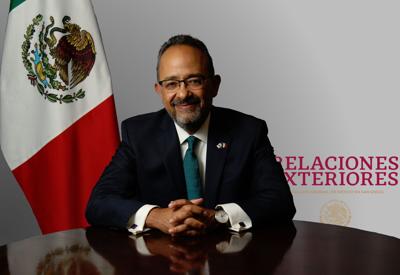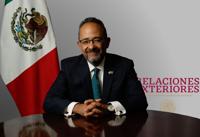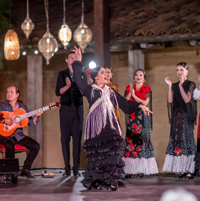
Mexican Consul General in Los Angeles Carlos González Gutiérrez.
Unlike other Mexican public policies, which lack continuity from six-year term to six-year term, the outreach to Mexican communities abroad has been maintained for more than three decades, states Ambassador Carlos González Gutiérrez, the Mexican Consul General in Los Angeles.
He describes this persistence as exceptional and states that it has been achieved thanks to the consular network established primarily in the United States, as well as the consensus among Mexicans to look after the interests of their fellow citizens.
He notes that since 1990, there has been a gradual effort to improve the quantity and quality of services offered to Mexican communities by the 53 Mexican consulates in the United States.
In his nearly 40 years of professional experience, he identifies several key moments in the Mexico-United States relationship, such as the creation of the Mexican Communities Abroad Program alongside the negotiation of the Free Trade Agreement; the reform of the Mexican Dual Nationality Law; the ability to vote in Mexican elections while living abroad; the issuance of voter ID cards at consulates; and the creation of health centers for migrants, among others.
Regarding the issue of public health, which Mexican migrants lack so much, how does the Consulate support them?
The health centers were created in 2000 as a strategy by the Foreign Ministry to help immigrant communities, regardless of their immigration status or whether they have health insurance.
They operate as permanent offices, open during business hours, dedicated to advising Mexicans on where to receive free or low-cost medical care.
They are also responsible for organizing preventive health fairs in Mexican communities. The unique feature of these centers, located in each consulate, is that they are not staffed by Mexican government employees. Rather, they are overseen by a responsible fiscal agency that operates with resources from the Mexican government and funds managed by the agency itself.
And does the Consulate have the authority to hold health clinics in its jurisdiction and provide services beyond preventive healthcare?
For more than 20 years, Binational Health Week has been held every year. On that date, each consulate convenes a series of public and private agencies that offer health services to their fellow citizens through clinics. These clinics include cholesterol and glucose testing, blood pressure screenings, vaccinations, and optometry services. Additionally, once a month throughout the year, these health clinics are also held in other locations outside the consulate's jurisdiction.
How would you compare the dynamism of the Mexican Consulate in Los Angeles with others, being the second largest city in the world with Mexicans?
Rather, it should be compared with other diasporas. The Mexican diaspora is the largest in the world, along with China and India, and is exceptional both in its number—38 million people—and because it is concentrated in a single country.
There are 35 million Mexicans in the United States, of whom 12 million were born in Mexico. Because of this, no other country has the consular network that Mexico has in the United States, nor does it assign such a large percentage of its foreign service staff to the consulates of the host country.
And now, with the administration of President Donald Trump, who has maintained a rhetoric against Mexicans, what is the current situation?
I am a diplomat accredited to the United States, a guest, and it is not my place to comment on federal or state administrations. What I can tell you is that the United States has changed a lot and, unfortunately, we are experiencing a time of uncertainty because a specter of the American political system has made the anti-immigrant political banner a very important mobilization factor.
This has made the work of consulates difficult, and unfortunately, we are the ones who end up at the center of the culture wars that American political parties use to distinguish themselves from each other and mobilize their respective electorates. Therefore, we must be very careful not to be led astray.
However, in accordance with the Vienna Convention, our country's instructions, and with full respect for the sovereignty of our host country, our primary responsibility is to defend the rights of our migrants, ensure they have access to due process and judicial review and that their rights under U.S. and international law are fully respected.
Often, public discourse surrounding migrants is considerably divorced from reality and fails to acknowledge how much the United States economy, particularly in states like California and regions like this one, depends on immigrant labor.
And as a result of this uncertainty, has the work of the consulates increased?
There is a lot of fear, particularly among the undocumented population, because undocumented people carry an inherent sense of vulnerability and flee from anyone who represents authority.
In times like the present, where the discourse comes directly from Washington, [is] very aggressive and revolves around supposed mass deportations that must occur during the current administration, the first consequence is that people go into hiding and become even more marginalized. They also stop going to certain places for fear of being identified, detained and eventually deported. This has negative consequences for our community, starting with the fact that panic paralyzes.
On another topic, what do Mexicans abroad feel when their head of state visits?
In a city like Los Angeles, which has the largest concentration of Mexicans abroad, it is an opportunity for the head of state of Mexico, who is the highest authority in the country, in this case President Claudia Sheinbaum, to come and thank local authorities for the public policies implemented by the local government to facilitate the integration of migrants into American society.
It is an opportunity to encourage business, community and opinion leaders to become increasingly involved in Mexico's development.
Our country will not achieve its full development until it promotes the full participation of Mexicans abroad. Finally, the visit of the head of state is a way to speak to his fellow citizens and make clear the right to membership abroad, as well as the message that they are not alone.
And on the subject of migration, has the number increased in recent years?
For the past 10 years, the Mexican population in the United States has stagnated, even declined, although it increased again after the pandemic, but recently, it has been declining.
This is due to several factors: number one, the change in the demographic pyramid. In the 1980s, when the number of Mexicans abroad doubled every 10 years, our average age was 24; today it's 33, and a person of that age doesn't migrate so easily.
Secondly, although there is an income gap between Mexico and the United States, we have already become a middle-class country, and the alternative in Mexico is no longer so discouraging.
Of course, the income of a middle-class family in the United States is very different from the average middle-class family in Mexico. Even so, potential migrants consider that if they can buy a house or a car on credit in their country, or can send their children to college, there is no longer a need to migrate, regardless of the fact that incomes are not the same between the two nations.
Finally, in recent months, some Mexican consulates in the United States and Canada have experienced payment problems for their employees. Did the Los Angeles consulate experience this problem?
No.











(0) comments
Welcome to the discussion.
Log In
Keep it Clean. Please avoid obscene, vulgar, lewd, racist or sexually-oriented language.
PLEASE TURN OFF YOUR CAPS LOCK.
Don't Threaten. Threats of harming another person will not be tolerated.
Be Truthful. Don't knowingly lie about anyone or anything.
Be Nice. No racism, sexism or any sort of -ism that is degrading to another person.
Be Proactive. Use the 'Report' link on each comment to let us know of abusive posts.
Share with Us. We'd love to hear eyewitness accounts, the history behind an article.